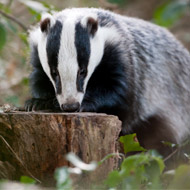Fifth of Cheshire badgers infected with bovine TB

This is the first study to test for bTB in badgers on the edge of the cattle TB epidemic in England.
One in five badgers on the edge of the bovine TB (bTB) epidemic in England tested positive for the disease, a survey has revealed.
The survey tested road-killed badgers collected in Cheshire in 2014 through a local stakeholder group, which included farmers wildlife groups and vets.
Scientists from the Universities of Nottingham, Liverpool and Lancaster then tested the carcasses for Mycobacterium bovis (M.bovis) and found that around 20 per cent were infected.
They also found the strain of M.bovis found in the badgers in Cheshire was the same as that found in cattle in the same area. The results have been published in the journal Scientific Reports.
This is the first study to test for bTB in badgers on the edge of the cattle TB epidemic in England. Previous studies in Cheshire from between 10 and 30 years ago found only a handful of infected badgers in south-west England.
Researchers say the findings suggest both badgers and cattle were part of the same geographically-expanding epidemic in Cheshire. However, the direction of any cross-species transmission and the drivers of this expansion cannot be determined.
“While there is general agreement that in endemic areas the disease can be transmitted among and between cattle and badgers, the role of badgers in the expansion of the epidemic has not been studied,” said professor Malcolm Bennett from the University of Nottingham.
He continued: “The epidemic could expand through cattle-to-cattle or badger-to-badger transmission, or a combination of the two with cross-species transmission.
“Determining whether or not badgers on the edge of the cattle epidemic have TB is the first step in unpicking this tangle of cause and effect, and examining badgers that had already been killed on the roads seemed the obvious way to collect the evidence for this pilot study.”



 The RCVS has announced a new version of its 1CPD mobile app, with enhanced features for veterinary surgeons and veterinary nurses to record their continuing professional development.
The RCVS has announced a new version of its 1CPD mobile app, with enhanced features for veterinary surgeons and veterinary nurses to record their continuing professional development.